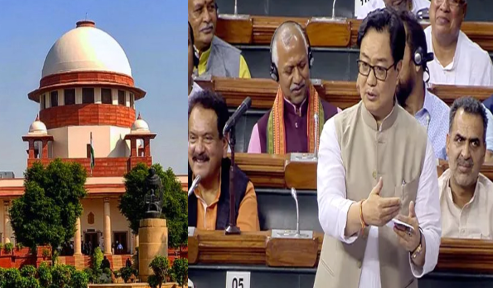
Minister of Law and Justice Kiren Rijiju on Thursday told the Parliament that the Centre had asked the Supreme court Collegium to have in place a screening and evaluation committee for the appointment of judges, but the apex court had shot down the idea.
In a startling revelation, Kiren Rijiju said in a written reply before the Rajya Sabha that “for the appointment of judges in the high courts, the committee should consist of a representative nominated by the government of India and a representative of the state government(s) under the jurisdiction of the high court, as nominated by the chief minister(s).”
Rijiju clarified the government’s stand by stating that the Supreme Court has not been recommended to include a nominee of the government in the Collegium for appointments to the higher judiciary.
“It was proposed that the committees screen and evaluate relevant material on the suitability of prospective candidates, acting as a facilitator. The decision to make recommendations will continue to be exercised by the respective Collegiums of the Supreme Court and high courts,” the reply stated adding that the Supreme Court did not give consent to the creation of such committees
In January this year, the law minister wrote to the Supreme Court, emphasising the importance of finalising the Memorandum of Procedure for various judicial pronouncements, as well as forming a search and evaluation committee comprised of government nominees.
“It has been proposed that for the appointment and transfer of chief justices and judges of high courts, the names recommended by the chief minister can be received by the search and evaluation committee along with the names taken from senior judges outside the Collegium and eligible candidates taken from the database [of judicial officers and advocates] as maintained by the proposed secretariat.”
“The high court Collegium may deliberate upon a panel of names drawn up by the search and evaluation committee and recommend the names of the most suitable candidates for appointment of judges in the Supreme Court, chief justices, and judges of the high courts,” the law minister noted.
The government also told the Parliament that it has sought reconsideration of the Supreme Court’s Collegium on 18 proposals sent by it to the government for high court judges’ appointments.
The law minister responded to additional inquiries about the number of judges appointed to the Supreme Court and high courts over the previous five years, as well as about the number and percentage of judges from Scheduled Castes (SC), Scheduled Tribes (ST), Other Backward Classes (OBC), religious minorities, and women, by saying,
“Since 2018, 554 judges have been appointed to various high courts, of which a whopping 77.61 per cent are from the ‘general’ category. Only 3.42 per cent are SCs, 1.08 per cent are STs, 10.46 per cent are OBCs, and 4.87 per cent are from religious minorities.”
The response also stated that only 15.16 percent of the judges appointed to the high courts in these years were women, implying that nearly 85 percent of the judges are men.




